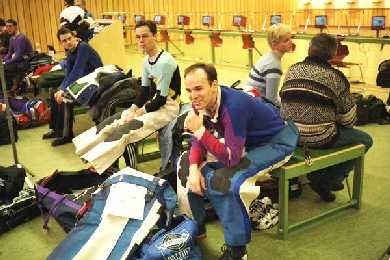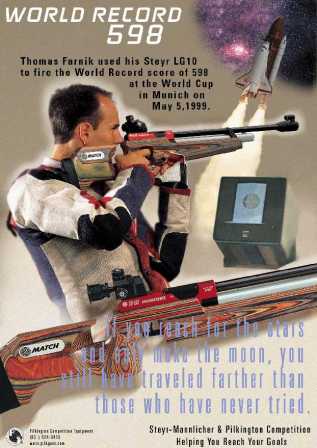INTERVIEW WITH THOMAS FARNIK
Thomas Farnik of Austria has numerous World Cup wins in small bore and air rifle, and is a past ISSF MAle Shooter of the Year and has held the World Record in Air Rifle with 598.
How did you start shooting?
My father was a shooter also. Not very good, but he enjoys it. A pistol shooter and with the age of 12 he took me for the first time to the shooting range.
And did you start with pistols?
Rifle.
And you’ve always shot rifle?
Yes, first time just at home, at small balls and little soldiers and things like that. A real later I started shooting on targets.
Who would you say was the greatest influence on you was on your shooting?
My father.
He’s also coached you quite a bit up through?
Yes, just always a little bit. But he didn’t know too much about rifle shooting and about shooting positions, like prone and standing. So the first trainer was one from my part of the country, he was the first trainer for me. And after that the Army trainers, sometimes.
You shoot for the Austrian Army, like our AMU, right?
Yes.
What’s your most valuable practice drill?
I’m not very sure about it, some little things but maybe a little bit training without jacket to get a better feeling because the stiffness of the jacket gives not the right feeling. So maybe it moves you in a direction your natural position is not.
Shouldn’t your jacket fit better so that it fits you in your natural position?
Yes, yes but it’s not easy to find the best jacket.
How do you handle the mental game during the match?
That depends on the day and on the competition. It’s much different. I have some things that can use to help me. If I see that there are many people behind me (watching me) and I’m shooting good, I say to me that the person shooting next to me, he is the one they are looking at, because he’s shooting 600 or something like that. So I have some plans where how I can react.
 Do you shoot all 60 shots at once or do you normally sit down and take a break in between shooting?
Do you shoot all 60 shots at once or do you normally sit down and take a break in between shooting?
Sitting down, never. Putting down the rifle sometimes but I try to go on shooting.
How do you know when to put the rifle down and stop for a minute?
If I have shots where I don’t see where they are coming from. If I think it should be a ten to the right and it’s a ten to the left or it’s a 9 and it should be a 10 then you have to think about it, ” What do I not focus on?” Or something like this.
How has shooting on electronic targets changed they way you have to think, because you see immediately your shot, and all your previous scores are right there and on paper you would only see one and then it’s gone?
Yes, you see if it’s ten points here or a 9.9 that’s the main point between the electronic systems and natural targets. You can not make something special, you must get used to it. That’s it; there’s nothing, no special rule. You must say, “You can handle it.”
Do you think of anything in particular while you’re shooting?
I try to think about my technique.
Just about your technique? Or do you have like a song or a rhythm or anything that you do to make you focus on you technique?
No. I just focus on two or three points that’s maybe the weight more to the left foot or the right hand strong grip and things like that. If you concentrate on these three or four points then you have enough to do for the whole competition if you concentrate on it.
How do you prepare for a match at the beginning of the season verses later in the season when you’ve got the national championships or the Olympic tryouts or something, do you prepare any differently?
season when you’ve got the national championships or the Olympic tryouts or something, do you prepare any differently?
No, that’s the same to me. I try to shoot every competition the same.
Do you do a lot of dry firing or not?
Not a lot but a bit. I do I try to do it between and it’s not good to shoot that much because there’s the chance you could get un-concentrated so I try to shoot not that much. About 40-50 shots, that’s enough for training, then maybe next training start with dry firing and then just 20 shots. That’s enough.
How many shots do you shoot in a day?
From 20 up to 100.
Do you train with weights?
Yes, especially the season from September until December and this time I’m doing a little bit work out.
But you don’t train with weighs during the shooting season?
A little bit but not much.
Do you do any cardiovascular training?
Yes, mountain biking, jogging, little bit playing tennis, little bit playing soccer. But nothing really special and nothing really much.
What’s one thing that you wished you could have learned earlier in your shooting career?
Many things. I didn’t have a good trainer like the German team, they had a good trainer, and then I see they have many advantages against me. When I started I had to learn many things for myself.
How do you go about selecting the diameter on the front aperture of the front sight, and then the rear sight iris for the light conditions?
The front sight I nearly never change. Just a little sometimes. I think I remember once, one competition this year it was very bright outside and very dark around so I had to go down a little bit. I have now 4.1 and then maybe I shot 3.9 or 4.0. I don’t change a lot of that. The rear, I’m from 1.0 to 1.2 there. I also do not change that much. I have a visor and eye shades so there’s not coming too much light into my eyes that I hope it’s always the same.
If you were telling a new junior shooter starting out what should he work on the most?
One of the most important things is that new shooter, he has to learn a method to like maybe concentrate. Like yoga or something like that. I think that’s one of most important thing in shooting that you know your body, you must know which muscles you can relax, which muscles are under tension and which are relaxed.
